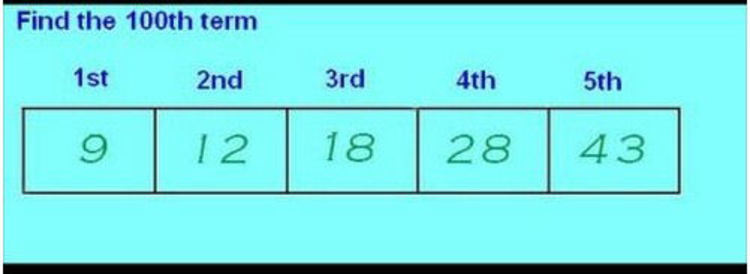This section requires Javascript.
You are seeing this because something didn't load right. We suggest you, (a) try
refreshing the page, (b) enabling javascript if it is disabled on your browser and,
finally, (c)
loading the
non-javascript version of this page
. We're sorry about the hassle.
3 solutions
what represents n and other unknowns, can you substitute in?
This series requires a some observations.
Fist of all, it is necessary to identify the series. We see that it is formed by adding triangle numbers to one term to get the next term. What I mean is:
9 , ( 9 + 1 + 2 ) , ( 9 + [ 1 + 2 ] + [ 1 + 2 + 3 ] ) , ( 9 + [ 1 + 2 ] + [ 1 + 2 + 3 ] + [ 1 + 2 + 3 + 4 ] and so on.
So, we can now deduce that the 1 0 0 t h term would be of the form:
9 + [ 1 + 2 ] + [ 1 + 2 + 3 ] + [ 1 + 2 + 3 + 4 ] + [ 1 + 2 + 3 + 4 + 5 ] + . . . . . . . . . . . . . + [ 1 + 2 + 3 + 4 + . . . . . . . + 1 0 0 ]
Now, another observation shows that in the 1 0 0 t h term, along with one 9 we have 99 sets of [1+2], 98 sets of 3 , 97 sets of 4 , .........., 1 set of 100.
So, the 1 0 0 t h term can be written as:
9 + 9 9 × [ 1 + 2 ] + 9 8 × 3 + 9 7 × 4 + . . . . . . . + 1 × 1 0 0
= 9 + 2 9 7 + ∑ n = 3 1 0 0 n × ( 1 0 1 − n )
= 9 + 2 9 7 + ∑ n = 3 1 0 0 1 0 1 n − ∑ n = 3 1 0 0 n 2
= 9 + 2 9 7 + 2 1 0 1 n ( n + 1 ) − 6 n ( n + 1 ) ( 2 n + 1 ) − − − − − I
But these formulas are for sum of respective functions of first n natural numbers, not for a range. so we need to remove from them the values at n = 1 , 2 .
at n = 1 , n ( 1 0 1 − n ) = 100
at n = 2 , n ( 1 0 1 − n ) = 2 × 9 9 = 198.
So, 100 + 198=298 needs to be subtracted from the above result.
Plugging n=100 in I , and subtracting 298, we have:
9 + 2 9 7 + 2 1 0 1 ( 1 0 0 ) ( 1 0 1 ) − 6 1 0 0 ( 1 0 1 ) ( 2 0 1 ) − 2 9 8 = 1 7 1 7 0 8 .
Did you notice that you got a different answer?
Log in to reply
Sorry, I put the answer as something different! My bad
I solved this by realising the difference between the numbers are the triangular numbers. The sum of the first n triangular numbers are called the tetrahedral numbers and are of the form 6 n ( n + 1 ) ( n + 2 ) .
Since it starts at 9 and the first difference is 3 (the second triangular number. We can dude the general term is 8 + 6 n ( n + 1 ) ( n + 2 )
To find the 100th term we simply plug in n = 1 0 0 to get 1 7 1 7 0 8
It worked!

The 3rd differences are equal therefore it is a cubic sequence of the form f(n)= a(n)^3 + b(n)^2 + c(n) + d
Solving 4 equations for the 4 coefficients we get f(n) = 1/6 n^3 + 1/2 n^2 + 1/3 n + 8
Then substituting 100 for n we get 171708